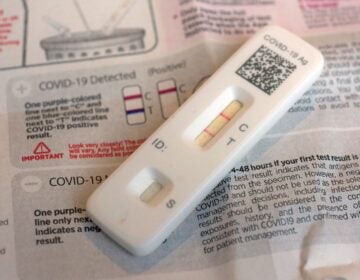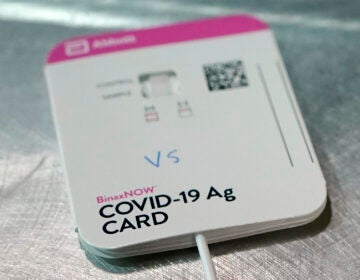Wolf extends stay-at-home orders across Pa.; Worker at Limerick nuclear power plant tests positive
Gov. Tom Wolf extended his stay-at-home order to all 12.8 million people in the state.
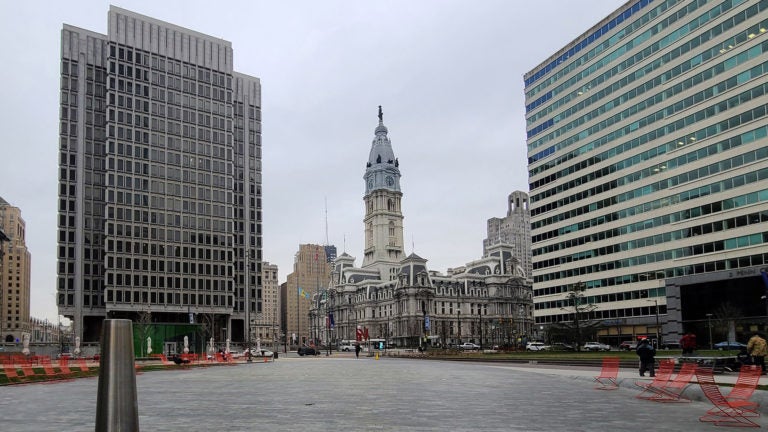
Love Park is empty during the coronavirus lockdown. (Mark Henninger/Imagic Digital)
Updated: 7:00 p.m.
_
As of Wednesday morning, there are 6,002 confirmed COVID-19 cases in Pennsylvania, 22,255 in New Jersey, and 368 cases in Delaware. Philadelphia has 1,675 cases.
Pennsylvania’s death toll stands at 79, New Jersey’s at 355, and Delaware’s at 11.
Wolf extends stay-at-home orders across Pa.
WHYY’s partners at Spotlight PA are reporting:
As the number of coronavirus cases continues to rise in Pennsylvania, Gov. Tom Wolf on Wednesday extended his stay-at-home order to all 12.8 million people in the state.
“This virus is spreading rapidly,” he said before issuing the order, set to begin 8 p.m. Wednesday. “It’s in every corner of our state, it’s gotten into our nursing homes and our prisons, and it’s filling up our hospital beds. Everyday we wait, the coronavirus spreads further and becomes more difficult to suppress. We need to act now.”
Under the order, employees such as those in health care and supermarket employees are deemed essential and allowed to go to work. Individuals can still go to grocery stores, go out if travel is required by a court order, or exercise.
But Pennsylvania Health Secretary Rachel Levine asked the public to take staying home seriously and not make “daily outings” to grocery or convenience stores. She asked people to go out only when they needed to.
Wolf’s move to enact a statewide order comes as COVID-19 continues its unrelenting spread into more counties. On Wednesday, state health officials reported 962 new cases, the largest single-day increase, bringing the statewide total to 6,002.
Sixty of the state’s 67 counties have confirmed cases, and 79 people have died after becoming infected with the virus. All of the fatalities have been among adults, according to Levine.
Close to 300 of the state’s COVID-19 cases are among health care workers and 200 are among nursing home residents. Levine said the percentage of patients who require hospitalizations is still hovering at 10%.
Over the past week, Wolf has issued stay-at-home orders for counties where the virus’ spread was most acute. As of Tuesday, 33 counties were on that list, covering large swaths of the state. But the governor had stopped short of a statewide order, saying he wanted to take a measured approach to limiting people’s movements.
The governor has so far opted against enforcement of the orders, relying instead on voluntary compliance.
Worker at Limerick nuclear power plant tests positive
A day after Montgomery County officials raised concerns about hundreds of workers converging on the Limerick nuclear power plant for refueling operations, a plant spokesman confirmed a local worker had tested positive for COVID-19.
That worker, however, was last at the plant on March 20, said Dave Marcheskie, the spokesman. The refueling outage, for which operator Exelon brought in 1,400 workers from around the country, did not begin until March 27, he said.
Montgomery County officials had asked Exelon to delay the refueling until the coronavirus pandemic subsided, citing fears that the plant could not ensure the recommended six-foot distance between workers and that an outbreak there would exacerbate the county’s already-high caseload.
Exelon moved ahead anyway, in part, Marcheskie said, because a refueling outage now would help ensure reliable power generation through the peak-demand summer months.
He also said the plant does, in fact, adhere to social distancing and other safety guidelines. Workers are screened for a temperature and other symptoms before entering the site and they must remain six feet apart at all times, according to Marcheskie.
Booze is back in Pennsylvania! Sort of
The Pennsylvania Liquor Control Board, or PLCB, announced Wednesday it would take limited online orders for delivery after closing all of the state’s 600 liquor stores in mid-March.
Starting Wednesday, orders can be placed at the Fine Wine and Good Spirits website with some restrictions.
The choices of booze and wine will be limited to 1,000 options, customers will only be allowed to order six bottles at most and it’s one transaction per address, which cannot be a store.
“We expect consumer interest and site traffic to exceed what we’ll be able to fulfill, at least initially, so we ask that customers be patient and understand that the PLCB is doing the best it can under extraordinary circumstances to balance consumer demand and public health,” said Board Chairman Tim Holden.
Access to the website will be randomized order so availability isn’t maxed out within minutes.
The board is not considering reopening stores at this time.
Center City gets new walk-in testing site
Philadelphia has opened a new city-run testing site in Center City, and it has slightly different rules than the one already collecting samples next to Citizens Bank Park.
Testing at the new site — officials declined to share its exact location, fearing a rush — is similarly restricted to health care workers and people over 50 with symptoms.
But instead of a drive-thru site, it’s a walk-in site, and an appointment is required. Those can be made by calling 267-491-5870. The location will be open 9 a.m. to 5 p.m. on weekdays.
Testing is also available at about 20 other sites run by medical providers in and around Philadelphia. Many require people to obtain a referral from a doctor.
20 new sites to pick up free food boxes
Philadelphia is massively increasing the amount of food it is giving away to residents after supplies ran out quickly earlier this week.
Starting Thursday, there will be 40 sites across the city offering food to anyone who needs it — up from 20 — and workers will pack 16,000 boxes, up from the 4,600 packed on Monday.
Each family is eligible for one box. A full list of sites, which are open on Mondays and Thursdays from 10 a.m. to 12 p.m., is available on the city’s website. Residents do not need to present an ID or proof of income for eligibility to receive food.
These sites are in addition to the more than 80 locations providing meals to students while schools are closed citywide. Kenney said Wednesday that more than 50,000 students have picked up food so far.
SEPTA imposes rider limits on buses, trolleys
In an effort to promote social distancing, SEPTA is now asking all non-disabled riders to board and exit from the rear door.
Starting Wednesday, the transit system also capped the maximum number of passengers on buses at 20, on trolleys at 25 and on the Norristown High Speed Line at 30.
Buses or trolleys above that cap will limit their service to drop-offs until there’s adequate space to let new riders on board.
In addition, SEPTA converted the Route 101 trolley to bus service and suspended the Route 102 trolley.
Still no citations for offending businesses
Although Gov. Tom Wolf has said authorities will enforce the closure of non-life sustaining businesses “to the full extent of the law,” Pennsylvania State Police still have not issued a single citation.
Instead, the state troopers have issued 123 warnings since enforcement began on March 23. That includes just five warnings total in Philadelphia, Montgomery and Delaware counties.
“We found that having a conversation with the business owners that may be operating in violation of the order has worked so far, so the warnings have been sufficient,” said State Police spokesperson Ryan Tarkowski.
“We understand that times are tough for businesses right now,” he added.
The Wolf administration has issued guidance to law enforcement agencies on what citations are most applicable for those who violate the shutdown order. The potential fines begin at $10 and scale upward.
Tarkowski also said that neither state police nor local police departments are enforcing stay-at-home orders that now apply to all counties. An exception is Philadelphia, where city officials say residents can now face a $100 fine for violating the mayor’s stay-at-home order.
“It’s not necessarily a matter of what’s the criminal penalty if I don’t obey,” Tarkowski said. “It’s more like Gov. Wolf sends these out to show that it’s serious and we all need to do our part.”
Krasner rejects soft-on-guns criticism
Philadelphia District Attorney Larry Krasner is defending himself after Mayor Jim Kenney called for a tougher stance on gun crime during the coronavirus pandemic.
Krasner spokeswoman Jane Roh said in a statement Tuesday that the office has “vigorously prosecuted” shootings, homicides and other violent crimes during the health crisis.
The statement challenges adversarial comments Kenney made during a virtual news conference the same day.
“I believe something needs to be done differently than what we’re doing,” Kenney said after five people, including a 1-year-old boy, were shot Monday during a birthday party in North Philadelphia.
Since March 20, Roh said the District Attorney’s Office has charged suspects in five homicides, and all of them were held without bail. In three out of four non-fatal shooting arrests in which someone was injured, prosecutors sought $999,999 in bail, an amount “far higher than state bail guidelines,” she said.
“We are seeking the equivalent of non-bail detention for offenders who are committing serious violent crime during a public health emergency — when all first responders should be completely focused on saving lives and protecting people’s health,” Roh said.
In the same timeframe, 71 unlawful carrying or gun possession cases have also been referred to the DAO by police. Roh said the office has accepted every case and requested “high bail” for all but seven suspects, who did not have prior criminal records.
Philly Orchestra musicians take pay cut
The musicians of the Philadelphia Orchestra are taking a pay cut to help the organization stay afloat during the coronavirus pandemic now that it can no longer perform concerts.
The musicians, who are unionized, have agreed to a 20% reduction in salary beginning today, April 1.
When asked how long the pay reduction will last, an orchestra spokesperson said, “Given the changing nature of the COVID-19 crisis, we are not certain at this time.”
The public face of the orchestra, conductor Yannick Nézet-Séguin, has also agreed to a 20% reduction in compensation for March and April.
Due to the pandemic, the orchestra has been forced to cancel all performances until at least May 10. The musicians last performed on March 12, when it streamed its scheduled Beethoven symphony concert from an empty Verizon Hall.
If you want to watch that performance, you can do so here on WHYY’s website.
VA office workers demand administrative leave
Even after two colleagues tested positive for COVID-19, some workers are still being forced to report to work at the Philadelphia’s Veterans Benefits Administration regional office, their union said this week.
That’s “appalling,” said Jim Rihel, president of American Federation of Government Employees Local 940. Instead, those workers should be given administrative leave — paid time off without having to use their vacation days.
The Philadelphia regional office, like dozens of others nationwide, was closed to the public starting March 19, although staff is continuing to process claims and benefits.
Nonessential staff were initially asked to work from home, Rihel said. But management then asked anyone without the necessary technology to return to the office, where they lack even basic personal protective equipment like gloves, he said.
“Until the VBA can provide these employees with the technology needed to telework, they must authorize administrative leave,” Rihel said in a statement. “The physical and mental health of these employees — who are tasked with providing critical services to veterans — should be the number one priority. How can management expect employees to come into a facility and do their best when they do not feel safe?”
A spokesperson for the U.S. Department of Veterans Affairs did not immediately respond to a request for comment.
State extends concealed carry firearm permits
Concealed carry firearms permits due to expire on or after March 19 have been automatically extended to May 30, the Pennsylvania State Police said Wednesday.
The move is necessary, the State Police said, because of the closure of some county courthouses and sheriff’s offices during the coronavirus pandemic.
In Pennsylvania, concealed carry is legal for those 21 or older after an application process.
WHYY’s Ximena Conde, Aaron Moselle and Peter Crimmins, and Spotlight PA’s Angela Couloumbis contributed reporting.
WHYY is your source for fact-based, in-depth journalism and information. As a nonprofit organization, we rely on financial support from readers like you. Please give today.


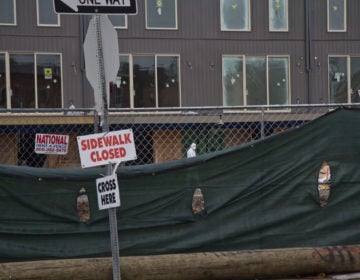
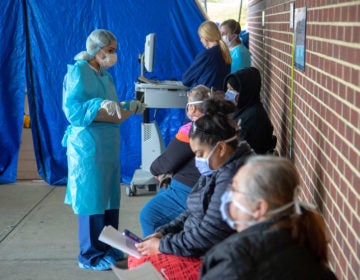
![CoronavirusPandemic_1024x512[1]](https://whyy.org/wp-content/uploads/2020/03/CoronavirusPandemic_1024x5121-300x150.jpg)

